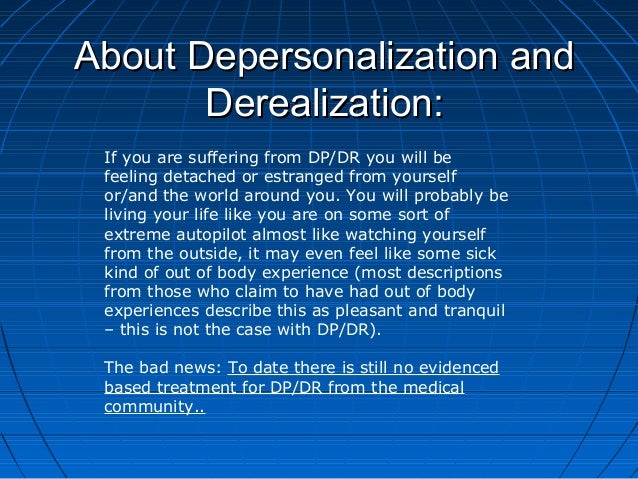

The people with whom you interact on a regular basis may seem unfamiliar to you or mechanical). Derealization may cause one to question the purpose of things in their everyday environment. ĭerealization as Part of DPD Derealization is often a manifestation of DPD. (e.g.one’s vision may be distorted so that objects appear larger or smaller than they really are, a familiar scene may seem foreign or somehow perverted, or objects in the environment may seem like they are somehow not the same as they are known to be, as though they are not the right size/shape, or alien in some other way). Derealization is described as the experience of the external world as strange or unreal. Derealization refers to alteration of the environment as it is perceived. Derealization Depersonalization refers to an altered perception of oneself. “ Gone Blank” - Individuals with DPD may have difficulty concentrating, their thoughts may be jumbled or confused, or they may have difficulty retaining new information. Mental and Emotional Numbing -Individuals with DPD report that they use a limited percentage of their brain during daily activities or that they do not feel any true emotional connection in their relationships, even to their spouse or children. Main Feelings of DPD “ Auto-pilot ”- one may feel as if an unknown force has taken control of their body and that their body acts independently of their brain. ĭepersonalization Disorder (DPD) Persistent or recurrent experiences of feeling detached from one’s mental processes or body, as if an observer Depersonalization causes significant distress or impairment in social, occupational, or other functioning During the experience of depersonalization, reality testing remains intact, one is aware of his/her experiences are unusual The depersonalization experience does not occur during the course of another mental disorder and is not due to the physiological effects of a substance or a general medication (American Psychiatric Association, 2000) Ĭoining the DPD In 1898, Ludovic Dugar, a French psychologist, coined the term depersonalization to describe the lack of normal mental function, or personalization, in those experiencing troubling symptoms. Depersonalization Disorder (DPD) is estimated to occur in about 2% of the population (Sierra, 2008).

50-70% of people would say that they have experienced depersonalization at some point in their lives. Depersonalization is an experience that does not necessarily mean you have a psychological disorder. What is Depersonalization? Depersonalization is conceptualized as a psychological numbing reaction that is evoked during times of extreme stress, representing an adaptive mechanism when experienced during discrete episodes. Bio-Behavioral Institute Great Neck, NY 11021 Depersonalization: Clinical Features and Treatment ApproachesĭEPERSONALIZATION: CLINICAL FEATURES AND TREATMENT APPROACHES Fugen Neziroglu, Ph.D.


 0 kommentar(er)
0 kommentar(er)
